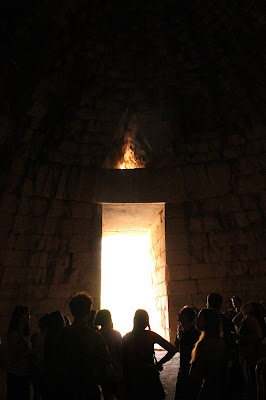Hadrian's Villa, Tivoli
We have spent an hour in silence with no media or even picture taking (I think some skipped that part, but I held resolutely). I have wandered around in the quiet and grandeur and had time by myself to think. I dreaded it a bit at first, but a minute or two in I wished we had two hours of silence. It is a gift.
Hadrian's Villa has some impressive ruins. Most impressing to me was perhaps the canal that was part of the “Egyptian” portion. It was a a very warm walk in the sun from one end of it to the other. Reaching the terminus, though, with its structure and the shade that it created, was like walking into Grandma's house on a summer day in South Georgia. Air conditioning blasting. Hot to cold in an instant; and in this case dry to moist as well. The smells and feel of the air changed to dampness and there was a cool breeze. I cannot believe the engineering expertise of 2000 years ago that makes such things possible…even in the ruins.
Aside from that section, my favorite part has been the old-growth olive trees. While they are interspersed throughout, over on one side of the site there runs a grove. I spent quite awhile here at the end of my hour, sitting in the shade, feeling the breeze, smelling the grass. We have been so urban for a while now that these things stand out to me. Not only because of how they bless my senses, but also because of this idea: that Hadrian in all of his glory has been gone for centuries and these yellow flowers, thistles, and olive trees keep falling to the ground that new life will come. I wonder whether these same sorts of flowers grew when the villa was at the height of its splendor. It has been a good morning to “consider the lilies, how they toil not neither do they spin, and yet Solomon [or Hadrian] in all his glory was not arrayed like one of these. And if he cares for the birds and the flowers of the filed, how much more does he care for his flock? (Luke 12)
One of the most striking things about the morning thus far has been e sounds. Apart from the rural sounds that you would expect–birds, bees and wind in the trees–we have had a (near) lack of sirens and city noises, although from where I am on the side of the hill I could hear distant church bells strike eleven. But the most striking difference has been that here I can hear my own footsteps, whether crunching on gravel or padding on stone or disrupting the grass. In the city, my steps on the ubiquitous cobblestones are quiet and drowned out by everything else. For someone thinking so much about pilgrimage, the difference in what those sounds mean for walking is kind of a big deal. In this place the sound of steps announce presence. But if no one can hear them, as in the city, do my steps matter? Do they exist? How do I fit in or matter or leave anything behind? How can I tell whether I am going anywhere?
Rome is too-much, in an eternal city sort of way. While it is easy to lose ourselves there, we can also be part of her story--as co-inheritors of Western civilization--and see her as constantly in motion instead of trying to capture all of the chronological stages separately (as our guide Francesca encouraged us to do). Sitting here outside of Tivoli, alone and quiet, it helps to remember that even Hadrian wanted to retreat from Rome, and that this was as good a spot then as it is now. From what I can gather, he took a lot of walks here, too. It has been a refreshing morning of peace amidst the storm.
































